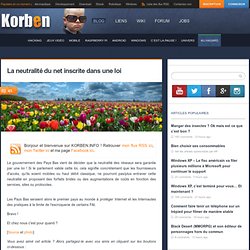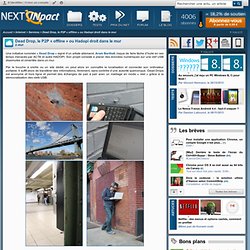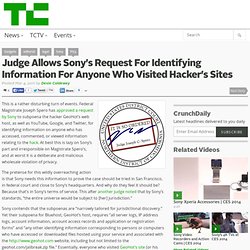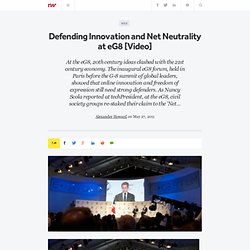

La neutralité du net inscrite dans une loi. La neutralité du net inscrite dans une loi Le gouvernement des Pays Bas vient de décider que la neutralité des réseaux sera garantie par une loi !

Si le parlement valide cette loi, cela signifie concrètement que les fournisseurs d'accès, qu'ils soient mobiles ou haut débit classique, ne pourront pas/plus entraver cette neutralité en proposant des forfaits bridés ou des augmentations de coûts en fonction des services, sites ou protocoles. Les Pays Bas seraient alors le premier pays au monde à protéger Internet et les Internautes des pratiques à la limite de l'escroquerie de certains FAI.
Bravo ! Et chez nous c'est pour quand ? [Source et photo] Vous avez aimé cet article ? What is Net Neutrality. Dead Drop, le P2P « offline » ou Hadopi droit dans le mur. Une initiative nommée « Dead Drop » signé d’un artiste allemand, Aram Bartholl, risque de faire tâche d’huile en ces temps menacés par ACTA et autre HADOPI.

Son projet consiste à placer des données numériques sur une clef USB dissimulée et cimentée dans un mur. Par le bouche à oreille ou un site dédié, on peut alors en connaître la localisation et connecter son ordinateur portable. Il suffit alors de transférer des informations, librement, sans contrôle d’une autorité quelconque. Dead Drops est anonyme et hors ligne et permet des échanges de pair à pair avec un maillage en mode « réel » grâce à la démocratisation des clefs USB. Il y a 5 dead drops à New York pour l’instant C’est très peu, mais le projet vient d’être présenté le 20 octobre dernier à l’EYEBEAM de New York. Judge Allows Sony’s Request For Identifying Information For Anyone Who Visited Hacker’s Sites. This is a rather disturbing turn of events.

Federal Magistrate Joseph Spero has approved a request by Sony to subpoena the hacker GeoHot’s web host, as well as YouTube, Google, and Twitter, for identifying information on anyone who has accessed, commented, or viewed information relating to the hack. At best this is lazy on Sony’s part and irresponsible on Magistrate Spero’s, and at worst it is a deliberate and malicious wholesale violation of privacy. The pretense for this wildly overreaching action is that Sony needs this information to prove the case should be tried in San Francisco, in federal court and close to Sony’s headquarters.
And why do they feel it should be? Because that’s in Sony’s terms of service. Sony contends that the subpoenas are “narrowly tailored for jurisdictional discovery.” They also will subpoena YouTube and Google requiring identifying information for anyone who watched GeoHot’s video showing a PS3 hack. Every viewer. [edited for clarity] OPINION: Can we benefit from piracy? With mass lay-offs, studios dropping like flies and mega-franchises imploding under our feet, it’s tempting to declare that there’s never been a worse time to get into video game development.
The Association for UK Interactive Entertainment (UKIE) fuelled further negativity back in January by estimating that software piracy – that old scourge of the computing biz – may have cost the industry as much as $1.5 billion in 2010, based on a sold-to-pirated ratio of 1:1. While major publishers shout loudest over their hypothetical losses, common sense suggests that smaller independent studios suffer most from the explosion of piracy.
These companies have no cash cushions to fall back on, no assets to sell off, no enormous legal teams to deploy in their defence. They have little to lose, but lots to gain. And their close relationship with the net may give them valuable insight into how to discourage, work around or even – whisper it – actually benefit from software piracy. Defending Innovation and Net Neutrality at eG8. At the eG8, 20th century ideas clashed with the 21st century economy.

The inaugural eG8 forum, held in Paris before the G-8 summit of global leaders, showed that online innovation and freedom of expression still need strong defenders. As Nancy Scola reported at techPresident, at the eG8, civil society groups re-staked their claim to the 'Net. Prior to the forum, organizations concerned with human rights, liberties and civil society released a statement to the eG8 and G8 that advocated "expanding Internet access for all, combating digital censorship and surveillance, limiting online intermediary liability, and upholding principles of net neutrality. " In an impromptu press conference held on the grounds of the eG8 Forum, Jérémie Zimmermann, co-founder of La Quadrature du Net, journalism professor Jeff Jarvis, Creative Commons founder Lawrence Lessig, former ICANN board member Susan P.
[EN] La société civile s'en va t'en guerre à l' e-G8 from OWNI on Vimeo. What's changed? Photo by mikiane. Copier n’est pas voler – Le documentaire.